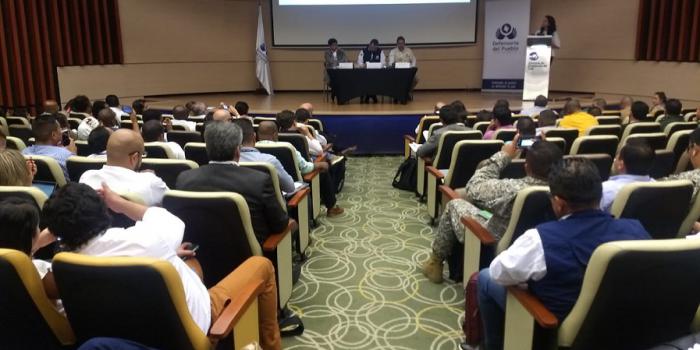
The Unit ratifies the Government's commitment with the victims of the Colombian Pacific Coast
The entity participated in the public hearing convened by the Ombudsman in relation to resolution 071 of 2019, which seeks to protect the human rights of communities and municipalities in this region.

The Victims Unit participated today in the Public Hearing convened by the Office of the Ombudsman in Cali, which sought to identify the advances and challenges of the Colombian State in order to guarantee the effective enjoyment of human rights in the Colombian Pacific. The above, within the framework of Defensive Resolution 071 of 2019, which calls on the authorities to take actions that protect the human rights of the communities and municipalities of this area, as expressed by the Regional Ombudsman, Carlos Alfonso Negret.
In the resolution, according to what the Ombudsman explains, “reference is made to forced displacement, the threats of those who are victims, social and ethnic leaders of the region, the dispute over control of the territory and illegal economies, the environmental problem, unemployment and social deprotection”, among other things.
Lorena Mesa, deputy director of the Victims Unit, brought to this audience a message in which the Government's commitments to the victims are expressed, pointing out, among other matters, “that the Unit is the main humanitarian actor in the country, because as soon as an emergency arises, together with the territorial entities to pay immediate attention”.
The official also highlighted the entity's actions, such as the delivery of humanitarian assistance to displaced victims (between January 2018 and July 2019) worth $ 13,742 million, which has reached 7,572 households.
Likewise, he pointed out that the program of Psychosocial Care and Integral Health for Victims (Papsivi), led by the Ministry of Health and Social Protection, which has reached 15,801 people, was implemented on the Pacific coast.
Likewise, the Unit shared that it entered into an agreement with the International Organization for Migration (IOM) that seeks to carry out comprehensive reparation measures in Acandí, Riosucio, Tumaco, Ipilaes, Policarpa, El Charco and Buenaventura, which will allow for 2,574 victims.
“It is also important to mention that there is a record of one hundred ethnic collective reparation subjects in this area, which are in different phases. And that technical assistance actions are advanced to the great majority of the municipalities located in this area (82%),” said Lorena Mesa.
(End/LJA/CMC)






